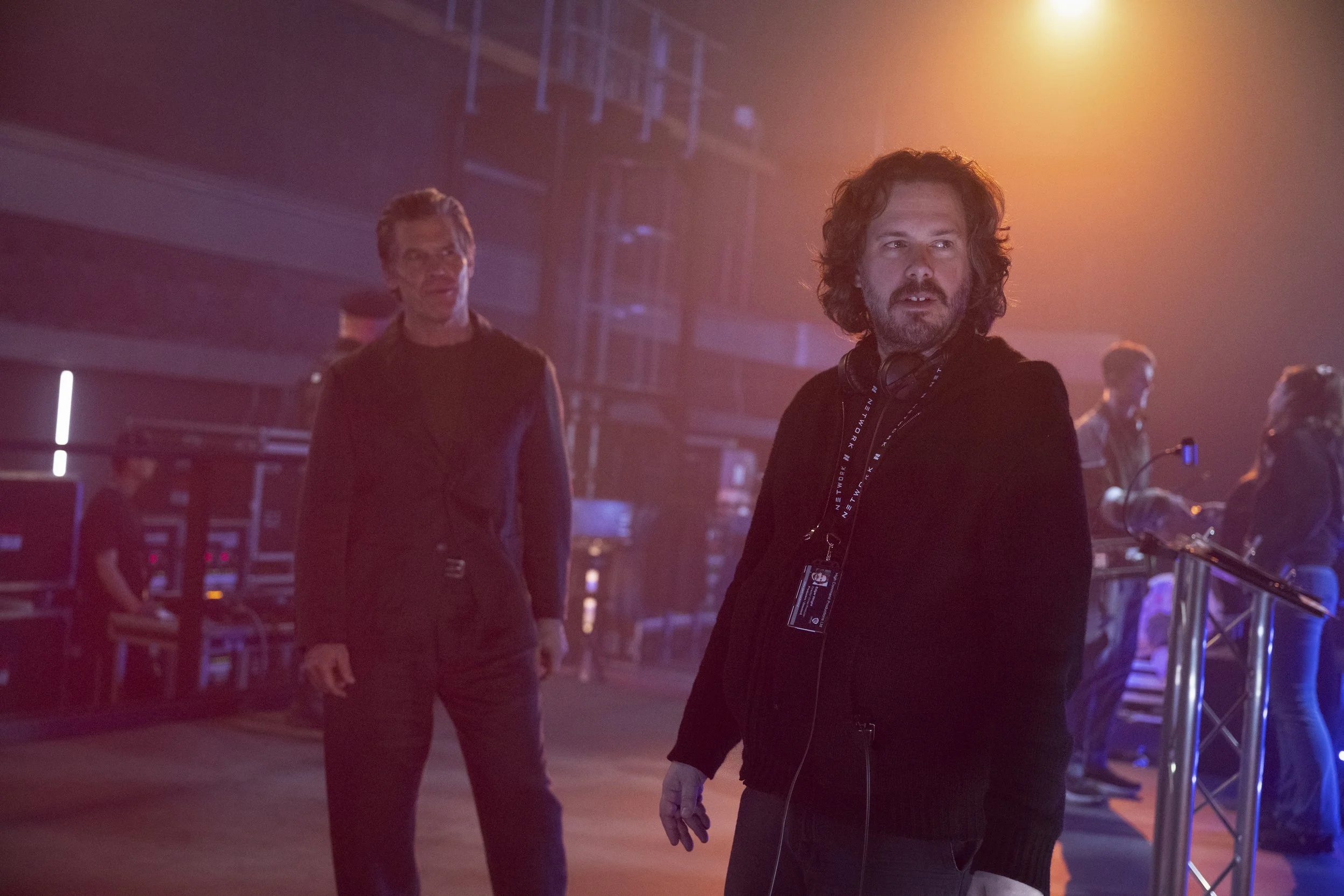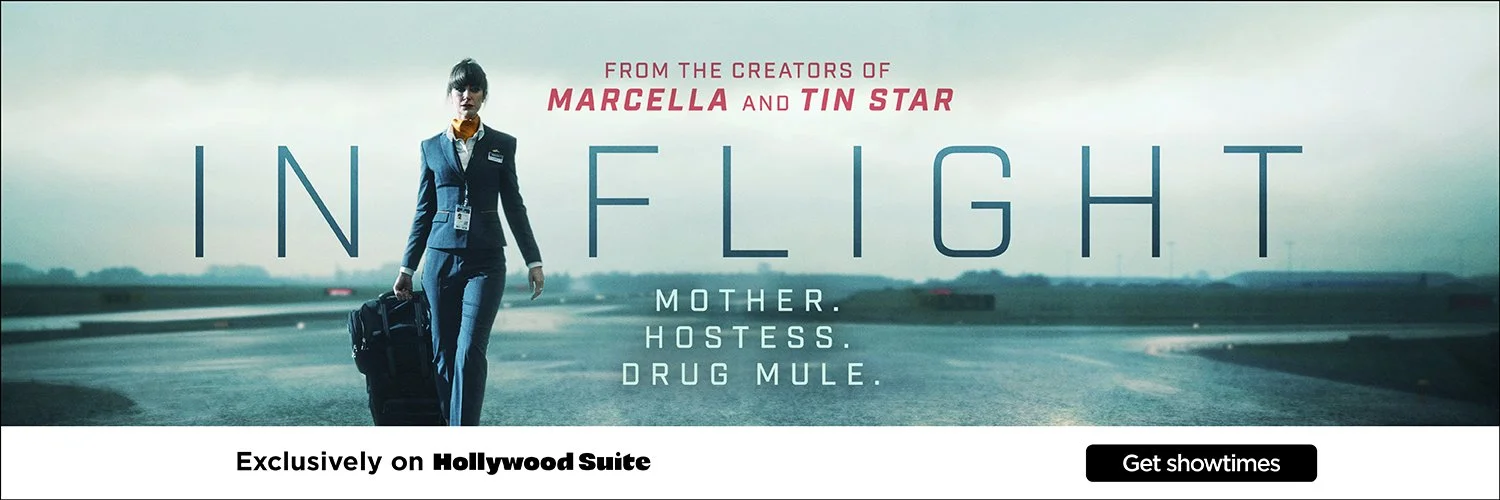Original-Cin Q&A: Edgar Wright on 'Reimagining' Stephen King's The Running Man
By Thom Ernst
Director Edgar Wright has always worked the edges of pop culture with the confidence of a counter-culture hero — the kind who raids the mainstream, steals the best bits, and makes them smarter, funnier, and oddly more sincere.
From The Three Flavours Cornetto Trilogy — Shaun of the Dead, Hot Fuzz, The World’s End — to the gorgeous fever-dream time-slip of Last Night in Soho, Wright has been remixing genre with the enthusiasm of someone who grew up renting VHS tapes by weight.
Now he reaches even further back, diving into 1987’s neon-soaked The Running Man (directed by Paul Michael Glaser and anchored by Arnold Schwarzenegger’s one-liners) and drags it — kicking, screaming, and surprisingly elegant — into 2025, the very year Stephen King set the original novel.
Director Edgar Wright on the set of The Running Man
That’s right: King wrote his grim dystopia in 1973, set it in 2025, and here we are, living in the future he imagined… give or take a couple of rocket cars and a state-sponsored death game.
To be absolutely accurate, Wright isn’t remaking Schwarzenegger’s version at all. He goes back to King’s original Ben Richards — less muscle, more desperation — and rumour has it King is more than pleased with the return to form.
Original-Cin sat down with Edgar Wright in his suite at Toronto’s Ritz-Carlton to talk about the authentic Running Man, securing King’s blessing, and reuniting with Brampton’s own Michael Cera — now older, wiser, and still incapable of delivering a bad reaction shot.
O-C: Before we begin, I have to say you are the only celebrity to retweet me and then later respond to a tweet. The first when you put out a call for a title for your Sparks documentary and you retweeted my suggestion (but didn’t use). Then sometime later someone asked via tweet if I’ve ever been retweeted by a celebrity. I mentioned the Sparks retweet, and added, “But it was probably just one of his staff responding.”
EDGAR WRIGHT: I don’t have a social-media manager!
O-C: And that’s exactly what you tweeted. (Laughs) I’ve been a fan since Scott Pilgrim, and watching The Running Man, I couldn’t help thinking of the “boss-battle” stylings in that film. Each character arrives with a distinctive mode, a flair. But here, you chose a more literary approach.
WRIGHT: That was the reason to do it. I read the book when I was 14, long before I saw the 1987 adaptation. So, when I finally watched the Schwarzenegger version, I knew just how different it was. As a Stephen King fan, I always felt there was an entirely different movie hiding in the source material.
O-C: And that book feels even more relevant today.
WRIGHT: The book is set in 2025.
O-C: Which is funny, given when he wrote it.
WRIGHT: Exactly. He wrote it in 1973—though it wasn’t published until ’82—and he picked 2025 as the setting. That’s wild in hindsight.
O-C: In your film, you make the deliberate choice not to tell us the year.
WRIGHT: Yes. With sci-fi, future dates age fast. Think of 2001 or Escape from New York—we’ve long passed them. We felt it better not to specify anything. It’s just “a different tomorrow.”
O-C: Your sensibilities as a filmmaker are layered—we see that most in Last Night in Soho. You must have known going in that most people would compare your film to the Schwarzenegger movie rather than the book. Were you concerned about disappointing viewers who wanted a remake of the 1987 film?
WRIGHT: Not really. There’s no point doing a karaoke version of the ’87 movie. I wouldn’t even call this a remake—it’s a new adaptation of the source material. My favourite remakes do something wildly different. We’re in Toronto—Cronenberg’s The Fly is a prime example.
O-C: Though Cronenberg will tell you The Fly isn’t a remake.
WRIGHT: (Laughs) It is and it isn’t. It takes the same source material and does something completely different.
O-C: And you wouldn’t call your film a remake either.
WRIGHT: It’s not. It’s a reimagining. That was always the intention. The ’87 film exists, and people who like it will still find things to enjoy in this. We even do a couple nods to it.
O-C: They’re very funny. I don’t want to spoil them, but you already have in the trailer.
WRIGHT: The Arnie “I’ll give you a hundred bucks” moment is in the trailer. We were happy to include it—and we got his approval.
O-C: You needed a photo approval?
WRIGHT: Yes, and he was very generous. He saw the movie and loved it. That made me very happy. He gave us the thumbs up.
O-C: With so many successful films out there, a thumbs-up shouldn’t be surprising—but it must still feel good.
WRIGHT: You’d like to get that approval, yes. Sometimes you feel like you’re making a film for an audience of one—you have to be the biggest fan of your own movie. But because Stephen King was involved and read the adaptation, it added new pressure. Now you’re trying to live up to the movie in his head as well as your own. So, in some ways I was making this film for an audience of two: myself and Stephen King.
O-C: With King, that’s always the case. He’s famously tough on adaptations.
WRIGHT: I feel very privileged he loves this one.
O-C: He’s said so publicly. That’s huge. I’ll have to reread the book to see how closely you honour the material—I was older than 14 when I read it. (Laughs)
O-C: One character I want to highlight is the host of The Running Man show. He’s iconic in the 1987 film (then played by Richard Dawson), and he has an equally fascinating role here. In your version, he’s Bobby T, right?
WRIGHT: Yes—Bobby T, played by Colman Domingo. In the ’87 film they merged the host and producer into one character. We split them again, as in the book. Josh Brolin plays the creator of the show, and Bobby T is the host.
O-C: His performance had shades of Ben Vereen in All That Jazz. Maybe even the emcee from Cabaret.
WRIGHT: Absolutely. Those were inspirations. What I love about Carmen’s performance is how he plays complicity. There’s a moment when Glen is onstage, furious about the slurs directed at his wife and child, and Bobby T says, “I love this.” That one line tells you everything about the character. He’s complicit, but he’d insist he’s “just doing his job.”
O-C: I have to ask about Michael Cera—one of our own. You gave him a wonderful role in the film..
WRIGHT: (Laughs) Brampton’s own! I loved working with Michael again. It’s been 15 years since we worked together as actor and director. When we made Scott Pilgrim, he turned 21 on set. Now he’s a father of two. I adore him, and I think people will be surprised by what he does in this film.
O-C: He’s always been remarkable, but here he feels particularly grounded. He gives the film a certain soul.
WRIGHT: He’s incredible. Truly one of the best.
O-C: They haven’t given me the wrap-up sign yet, so I’ll take the chance to say it: this was a real pleasure. I look forward to whatever you make next.
WRIGHT: Thank you! And now you know the truth—I don’t even have a social-media manager. (Laughs) So if you see me online, it’s really me.
O-C: Thanks so much.
WRIGHT: Cheers! Nice to see you again.


